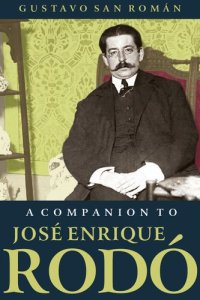
Ebook: A Companion to José Enrique Rodó
Author: Gustavo San Román
- Series: Monografías A Volume 375
- Year: 2018
- Publisher: Boydell & Brewer
- Language: English
- pdf
This Companion to José Enrique Rodó (1871-1917) is the first comprehensive intellectual biography in English of the great Latin Americanist, stylist, and writer on the ethical and aesthetic development of the youth of his subcontinent. Rodó is best known for his essay Ariel (1900), which marked the consolidation of modernity in Latin America in the wake of mass immigration and Spain's crushing defeat at the hands of a United States that wasimpressing upon its southern neighbours the unequivocal signs of its might. The circumstances were therefore most propitious for reflection on what being Latin American meant; Ariel did precisely that, as it pondered "roots" and proposed future "routes".
The book provides, in chronological order, a detailed and up-to-date assessment of Rodó's writings, his context and legacy, both immediate (during the period of arielismo) and current,and draws widely on unpublished material from the extensive archives of his papers held in Montevideo. As befits its subject matter, the book's aim has been idealistic: to cover all relevant aspects of Rodó's work in order to givethe fullest possible account of his worldview, including hitherto little-explored areas that shed new light on it, notably the relationship between his philosophical stance, religion and politics.
Gustavo San Román is Professor of Spanish at the University of St Andrews.
Table of Contents
Illustrations
Acknowledgements
Bibliographical Note
Introduction
Context: Family, Political Turbulence, Liberalism and Religion (to 1880)
Early Writings: The Lberal Newspaper Child and the Marks of a Catholic Upbringing (1881-1894)
Going Public: Revista Nacional de Literatura y Ciencias Sociales and Related Material (1895-1899)
Going Global: Ariel (1900)
Religion and Liberalismo y jacobinismo (1901-1906)
Personal Development andLliving the Good Life: Proteo (1906-1909)
Politics, Heroes, and Literature: El mirador de Próspero (1913)
Tying Loose Ends: Public Intellectual and Popular Pedagogue (c. 1910-1916)
Europe, Death and El camino de Paros (1916-1918)
Rodó's Legacy
Conclusion
Bibliography
Index
The book provides, in chronological order, a detailed and up-to-date assessment of Rodó's writings, his context and legacy, both immediate (during the period of arielismo) and current,and draws widely on unpublished material from the extensive archives of his papers held in Montevideo. As befits its subject matter, the book's aim has been idealistic: to cover all relevant aspects of Rodó's work in order to givethe fullest possible account of his worldview, including hitherto little-explored areas that shed new light on it, notably the relationship between his philosophical stance, religion and politics.
Gustavo San Román is Professor of Spanish at the University of St Andrews.
Table of Contents
Illustrations
Acknowledgements
Bibliographical Note
Introduction
Context: Family, Political Turbulence, Liberalism and Religion (to 1880)
Early Writings: The Lberal Newspaper Child and the Marks of a Catholic Upbringing (1881-1894)
Going Public: Revista Nacional de Literatura y Ciencias Sociales and Related Material (1895-1899)
Going Global: Ariel (1900)
Religion and Liberalismo y jacobinismo (1901-1906)
Personal Development andLliving the Good Life: Proteo (1906-1909)
Politics, Heroes, and Literature: El mirador de Próspero (1913)
Tying Loose Ends: Public Intellectual and Popular Pedagogue (c. 1910-1916)
Europe, Death and El camino de Paros (1916-1918)
Rodó's Legacy
Conclusion
Bibliography
Index
Download the book A Companion to José Enrique Rodó for free or read online
Continue reading on any device:

Last viewed books
Related books
{related-news}
Comments (0)